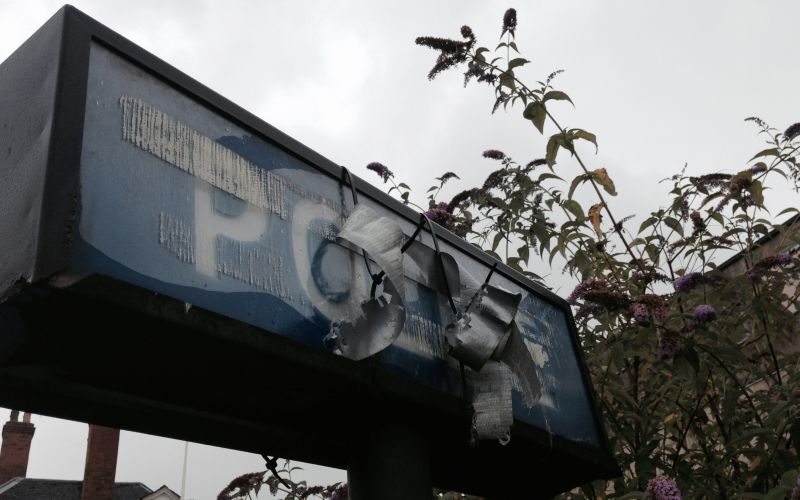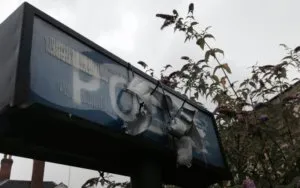Disabled campaigners have asked why a police officer who struck a black disabled teenager with his baton more than 30 times in just a minute – after she had flagged down his car to ask for help – is not facing prosecution.
PC Ben Kemp, 32, has been dismissed from the Metropolitan police after a disciplinary panel found him guilty of gross misconduct over the attack on the 17-year-old, who has learning difficulties and is a mental health service-user.
But the Crown Prosecution Service (CPS) has decided that Kemp should not be prosecuted.
There are now serious concerns that the incident will damage disabled people’s faith in both the Met and the wider police service.
Andrew Lee, director of People First (Self Advocacy), which is based in London and is run by and for people with learning difficulties, said the incident made him feel “sick to my stomach”.
He told Disability News Service (DNS): “I felt: this is a crime. This will have an impact on the person with learning difficulties for the rest of their life.
“It reinforces our lack of trust in the police, our belief that we do not have access to justice.
“It reinforces all of our beliefs that if this happens to me, I will not be believed.
“I think the violence will make us fear that we are not safe in our own communities.
“I fear that people with learning difficulties will be frightened to go out and will constantly think, ‘Who can I trust, who will believe me?’”
He said Kemp “needs to face a court”, but he said there should also be a way for the Metropolitan police as an organisation to face criminal proceedings for the actions of its officer.
Lee said that London’s mayor, Sadiq Khan, who is responsible for policing in the capital, should also be held to account for what happened.
A family member, who has seen the video footage of the attack, told Channel 4 News last night that it was “horrific” and showed the teenager had done nothing to provoke Kemp.
She said: “Not a cross word, not even a raised voice.”
She said the footage showed the teenager being sprayed with CS spray and then struck more than 30 times in a minute.
Anne Novis, a member and former chair of the Met’s Disability Independent Advisory Group (DIAG), former chair of Inclusion London and a long-time campaigner on disability hate crime, said she did not understand why Kemp was not being prosecuted.
She told DNS that the young woman had been treated “abhorrently”.
She said: “I believe and feel that he should be facing charges. It was one assault after another.
“This is about an assault on a disabled young person who reached out for help from the police.”
The 17-year-old, who has not been named, appears from official statements to have both learning difficulties and experience of mental distress, and ran off from an escorted walk in Newham, east London, on 8 May 2019.
She flagged down a passing police car, and officers’ own body-worn video showed her telling them that she was “vulnerable” and was a mental health service-user.
She initially agreed to get into the police car, but then left the vehicle.
When Kemp’s attempt to handcuff her was unsuccessful, he used CS spray less than a metre from her face and then began hitting her with his baton.
Another police unit arrived, and the teenager was tasered by an officer from that vehicle.
Meanwhile, Kemp continued to strike her with his baton, before she was eventually handcuffed and put into a police van.
Kemp struck her at least 30 times, according to a statement by the Independent Office for Police Conduct (IOPC), even though the footage showed she was “clearly in distress” and “appeared very frightened”.
But despite a police disciplinary panel proving gross misconduct, Kemp will not face any criminal charges.
The IOPC said that police investigations did not find any evidence of disability or race-related discrimination.
Five months after the assault, DIAG was forced to lodge a formal complaint about the Met’s “discriminatory” treatment of disabled protesters during the Extinction Rebellion protests in London in October 2019.
DIAG said then that it believed the force had breached the Equality Act by discriminating against disabled protesters, and warned that those actions risked causing “irreparable damage” to relations between disabled people and the Metropolitan police, and that the consequences of its actions would “take many years to heal”.
Lee said the attack by the police officer on the teenager appeared to be “double discrimination”, on the grounds of disability and race.
And he called for training for police officers to include a test that ensures they know how to engage with people with learning difficulties.
He said: “If you take five good police officers, there will be four officers that will not know how to communicate with people with learning difficulties.
“We live in a society where we have no access to justice. We have no faith that the law will protect us.”
Novis said she feared the incident would have an impact on disabled people across the UK.
She said: “What is going to be the impact on the confidence of disabled people now? If you ask the police for help, could you end up in that situation?
“Why are the words ‘hate crime’ not being mentioned?
“If we perceive someone is attacked because they are a disabled person… then it should be treated as a hate crime, and that would be our perception, that she was targeted, and maybe partly because of race.”
A CPS spokesperson said: “Prosecutors carefully considered the evidence passed to us by the IOPC in 2019 and determined that – taking into account the circumstances of this particular incident – our legal test was not met.
“It is our role to make a fair, independent and objective assessment based on the material presented to us.”
Chief superintendent Richard Tucker, who leads policing for the north-east of London, said Kemp’s use of force had been “utterly inappropriate” and “very disproportionate”.
He said: “On behalf of the Met, I apologise to the young woman and her family for how he behaved and to London’s wider communities for the impact this case undoubtedly has on the trust and confidence they have in how we police London.”
A note from the editor:
Please consider making a voluntary financial contribution to support the work of DNS and allow it to continue producing independent, carefully-researched news stories that focus on the lives and rights of disabled people and their user-led organisations.
Please do not contribute if you cannot afford to do so, and please note that DNS is not a charity. It is run and owned by disabled journalist John Pring and has been from its launch in April 2009.
Thank you for anything you can do to support the work of DNS…

 Ministers are considering further extension to disability hate crime laws, after pledge on ‘aggravated’ offences
Ministers are considering further extension to disability hate crime laws, after pledge on ‘aggravated’ offences Activists will protest over government’s refusal to engage with ‘deep-rooted’ mental health bill concerns
Activists will protest over government’s refusal to engage with ‘deep-rooted’ mental health bill concerns Abuse of disabled supporters at live sports events is growing problem, survey finds
Abuse of disabled supporters at live sports events is growing problem, survey finds